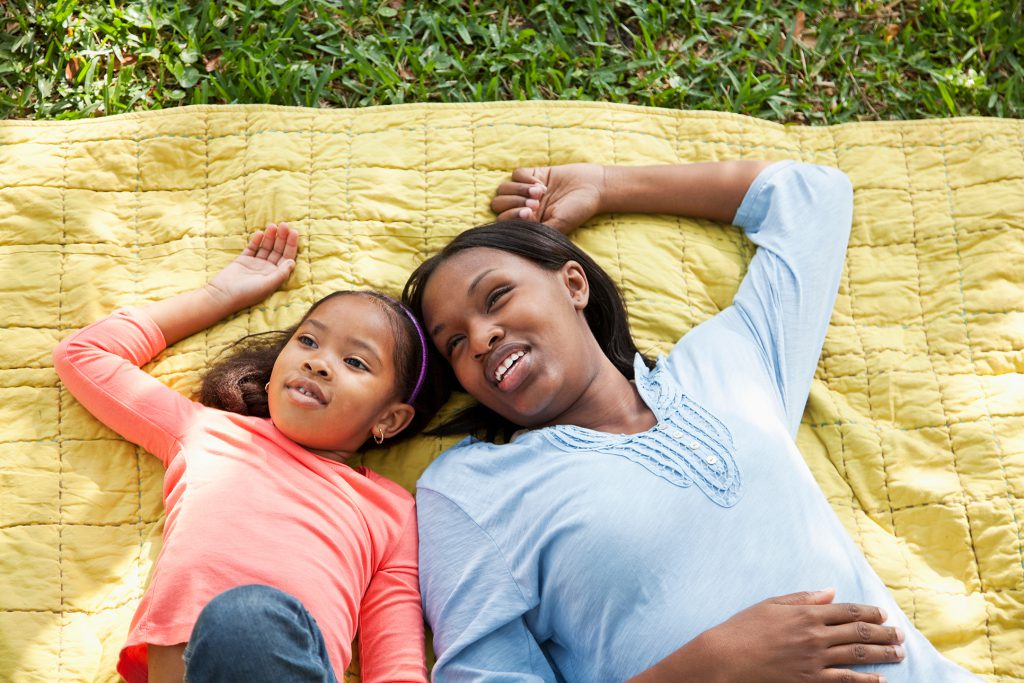
Parenting can bring waves of feelings. There are high and low emotional tides, and in between there is always movement. As caregivers navigate this complex moment in time, mindfulness can help adults to care for themselves and build protective factors.
“Mindfulness is the basic human ability to be fully present, aware of where we are and what we’re doing, and not overly reactive or overwhelmed by what’s going on around us.”1
Caregivers of children have significant responsibilities. They must meet children’s basic physical and emotional needs and teach children developmentally appropriate life skills. In order to provide steadfast support for children, adults need to find ways to meet their own basic physical and emotional needs too. During this stay-at-home time, families may find that some previous sources of comfort and enjoyment are less available. It is possible that additional stressors are present in their place. It is important for adults to find alternative forms of relief and balance.
Whether they find themselves in choppy or in quiet waters, caregivers can benefit from taking a moment to reflect, calm down and check in with themselves. This may look different for everyone — deep breathing, guided meditation, prayer, thoughts of gratitude or a walk. The goal is to take a few seconds or minutes to stop doing and just be. This mindful moment can offer awareness of feelings in mind and/or body. An article in the journal Preventing Chronic Disease states that mindfulness can contribute to, “the treatment of difficult and chronic clinical problems (e.g., chronic pain, mood disorders, substance abuse)…as well as for stress in healthy populations.”2 The article promotes the benefits of mindfulness activities for stress management and well-being.
Caregivers who take time to check in with themselves can develop an “intentional and nonjudgmental conscious awareness of the present moment.”2 It is common social practice to check in with others to see how they are doing. When caregivers ask themselves questions such as, “How am I feeling?”, “What do I need?” or “What has been the best part of today?”, they may become more aware of where they are feeling strong and where they could use some reinforcements.
In an article by parent and physician Dr. Kelly Ross, she writes that her best advice to new caregivers is to, “take care of yourself.” Noting the intensive commitment of attending to children’s needs, the author points out the importance of caregivers being responsive of their own needs as well. Dr. Ross writes that self-care is, “something that is so hard to do at times and yet so vital.”3 Mindful practices of deep breathing, meditation or other approaches can help caregivers to relax and help them notice what self-care might be helpful for them.
Dr. Ross’s specific recommendations for self-care echo the Strengthening Families Protective FactorsTM — Social and Emotional Competence of Children, Concrete Supports in Times of Need, Social Connections, Parental Resilience, and Knowledge of Parenting and Child Development. She notes that a caregiver, “who is well-rested, eats a healthy diet, gets plenty of exercise, maintains close relationships with friends and gets help when [they] realize [they are not] coping well, is far more equipped to be the best [parent they] can be than one who doesn’t do those things.”2 Taking time to check in with themselves allows caregivers to note how their body and mind feel and to consider how they might approach their needs and build on their strengths.
Mindfulness offers a pause for caregivers to care for themselves, considering their own needs, strengths, and desires. There are many ways to approach this practice, and children can do it too. Consider these resources.
Monster Meditations from Sesame Street build skills such as patience and uses the five senses to be aware of one’s environment, featuring Cookie Monster, Elmo, and others.
The Benefits of Yoga, from HealthyChildren.org, promotes the physical and mental benefits of unplugging and trying yoga breathing and moves.
Mindfulness Practices for Families from Zero to Three are designed for both caregivers and children. They include helpful techniques, such as balloon breath, pleasure gazing and even a craft idea or two.
Here are five mindful parenting tips from ZeroToThree:4
• Listen to your child with your full attention.
• Accept your child (and yourself) without judgment.
• Imagine your child’s feelings and match your response.
• Manage your own feelings and reactions.
• Show compassion for yourself and your child.
Sources
1 “What Is Mindfulness?” Mindful, 11 Feb. 2020, www.mindful.org/what-is-mindfulness/. Accessed May 28, 2020.
2 Kachan D, Olano H, Tannenbaum SL, Annane DW, Mehta A, Arheart KL, et al. Prevalence of Mindfulness Practices in the US Workforce: National Health Interview Survey. Preventing Chronic Disease 2017; 14:160034. DOI: https://doi.org/10.5888/pcd14.160034.
3 Ross, K. “How Taking Care of Yourself Makes You a Better Mom.” HealthyChildren.org, www.healthychildren.org/English/family-life/family-dynamics/Pages/How-Taking-Care-of-Yourself-Makes-you-a-Better-Mom.aspx. Accessed
May 28, 2020.
4 Gehl, M, et al. “Mindfulness for Parents.” ZERO TO THREE, www.zerotothree.org/resources/2268-mindfulness-for-parents. Accessed May 28, 2020.
